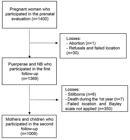Fetuses exposed to alcohol and/or tobacco are at risk for perinatal adversities. However, little is currently known about the association of the separate or concomitant use of alcohol and tobacco with infant motor and cognitive development. Thus, the objective of the present study was to investigate the association between maternal consumption of alcohol and/or tobacco during pregnancy and the motor and cognitive development of children starting from the second year of life. The study included 1006 children of a cohort started during the prenatal period (22-25 weeks of pregnancy), evaluated at birth and reevaluated during the second year of life in 2011/2013. The children were divided into four groups according to the alcohol and/or tobacco consumption reported by their mothers at childbirth: no consumption (NC), separate alcohol consumption (AC), separate tobacco consumption (TC), and concomitant use of both (ACTC). The Bayley Scale of Infant and Toddler Development Third Edition screening tool was used for the assessment of motor and cognitive development. Adjusted Poisson regression models were used to determine the association between groups and delayed development. The results indicated that only the ACTC group showed a higher risk of motor delay, specifically regarding fine motor skills, compared to the NC group (RR=2.81; 95%CI: 1.65; 4.77). Separate alcohol or tobacco consumption was not associated with delayed gross motor or cognitive development. However, the concomitant use of the two substances increased the risk of delayed acquisition of fine motor skills.
Motor skills; Cognition; Cohort studies; Risk factors; Prenatal exposure; Delayed effects

 Thumbnail
Thumbnail
